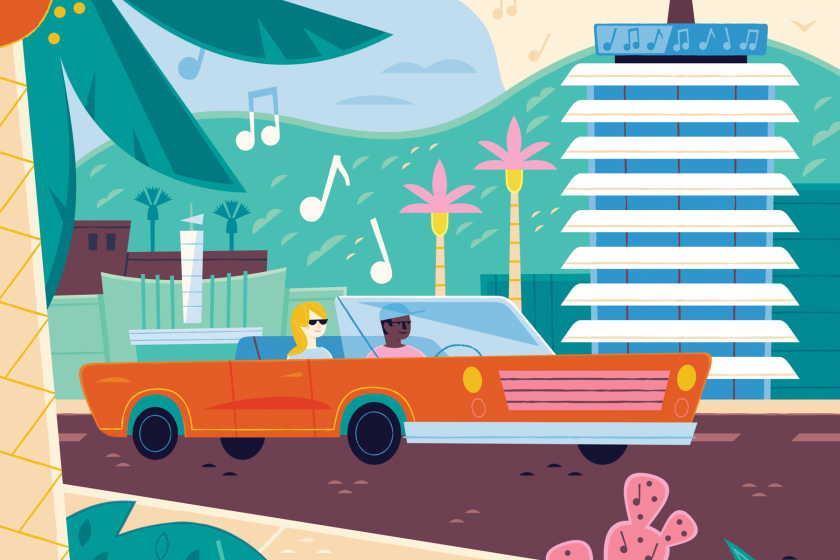Saying goodbye to Rainbo Records — and 80 years of pop culture history

- Share via
Once upon a time, Rainbo Records manufactured the sound of America.
Ravers and garage rockers, rappers and producers, talentless screamers, kazoo orchestras — anyone who wanted, quite literally, a permanent record of their work — contracted the Canoga Park-based company to make their 45s, flexi discs, albums, 8-track tapes, cassettes and CDs.
When U.S. troops stormed the beaches at Normandy in 1944, the record pressing plant was producing audio letters to soldiers stationed overseas. A decade later the company’s founder, Jack Brown, patented “record-on-a-box” technology and affixed paper-thin records directly onto 30 million cereal packages.
The company made ready-to-play campaign postcards with candidates’ voices imprinted on them, pre-recorded boot-camp commands for new recruits, miniature records for talking dolls and 78-rpm cardboard picture discs. Walt Disney commissioned Rainbo to manufacture the “Disneyland Talking Map,” a five-record, fold-out cardboard poster sold at the park’s grand opening.
Black Flag’s “TV Party” 7-inch single? Richard Pryor’s first comedy album for Laff Records? Both pressed by Rainbo, as was “Panic Zone,” N.W.A’s 1987 debut 12-inch, Dr. Dre’s “The Chronic,” Hüsker Dü’s “Zen Arcade” and the Minutemen’s “Double Nickels on the Dime” albums for SST and 2Pac’s “California Love.” The work of contemporary artists as varied as Kacey Musgraves, Kamasi Washington and Childish Gambino has been etched into vinyl at Rainbo.
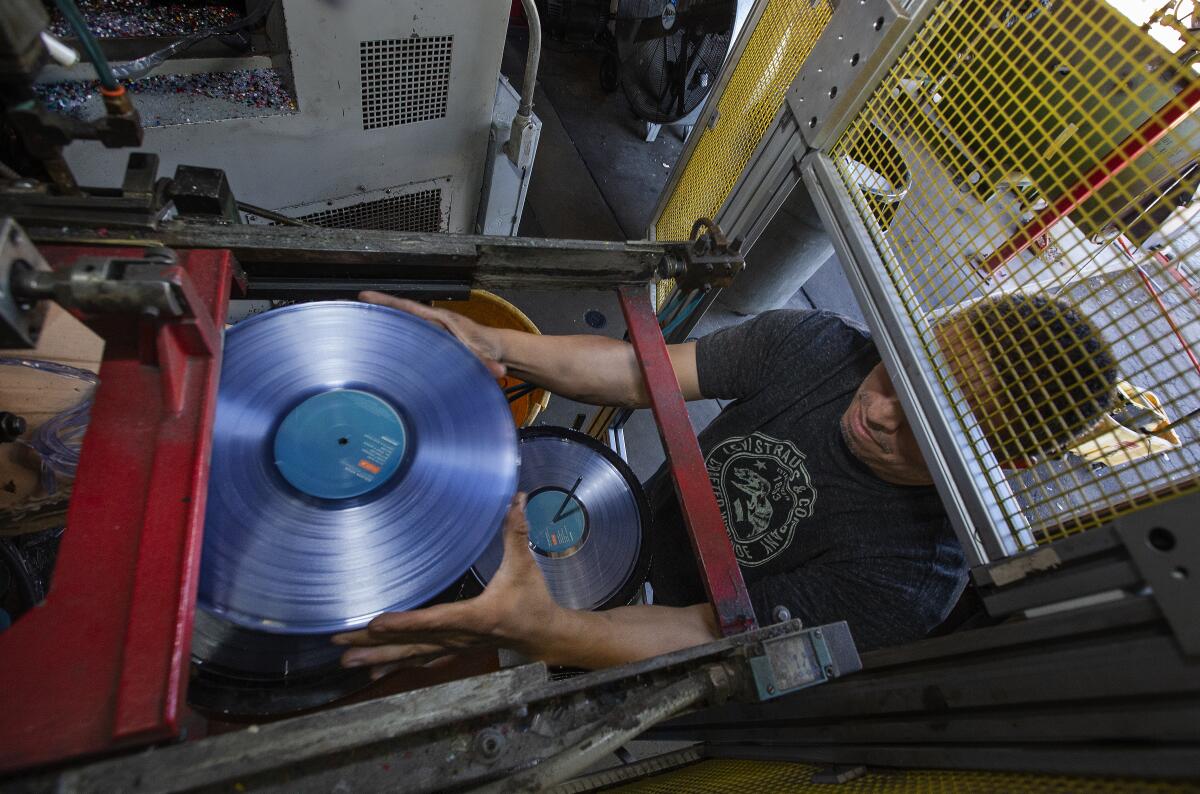
Although the digital revolution has rendered moot the need to own physical albums, the rise of cloud-based music platforms such as Spotify, Amazon Music and Apple Music has, ironically, helped propel vinyl back into the mainstream. Deep, intentional listening, analog-heads argue, is more rewarding through turntables and tube amps.
“True fans” buy the vinyl. In 2019, U.S. sales grew by 14.5%, part of a 14-year uptick that has yet to plateau.
Still, the market for vinyl is relatively small. In 2019, the format accounted for just 4% of U.S. music sales, compared with 82% for streaming and the remaining 14% for digital downloads and CD sales. In that same time period, 18.8-million new LPs were sold. By comparison, more than 1 trillion songs were streamed in 2019.
Which is one of the reasons why the era of Rainbo Records is coming to an end.
On Dec. 12, Rainbo’s longtime general manager Steve Sheldon retrieved the last-ever record to be pressed by Rainbo: a blue vinyl reissue of “The Other Side of Life” by the Moody Blues.
“I’m pretty distraught over it,” Sheldon said a few days before production stopped. “Up until the eleventh hour, I thought a white knight was just going to come along.”
Tall and skinny, with pale blue eyes, Sheldon has worked at Rainbo since 1971 and has been its general manager for 34 years. Like many aging lanky guys, the 67-year-old slouches a bit more than he did a few decades ago; at times his posture seems to reflect his current mood.
Were he 20 years younger, Sheldon says, he would have worked to uproot the whole enterprise to Texas or Tennessee, where the cost of doing business is lower. But a move would be pricey — and it’s not his company.
So Sheldon has spent the last several months informing customers of the closure, talking to employees (most of whom have already taken other jobs or have been let go as duties wind down) and asking clients to retrieve their stored assets.
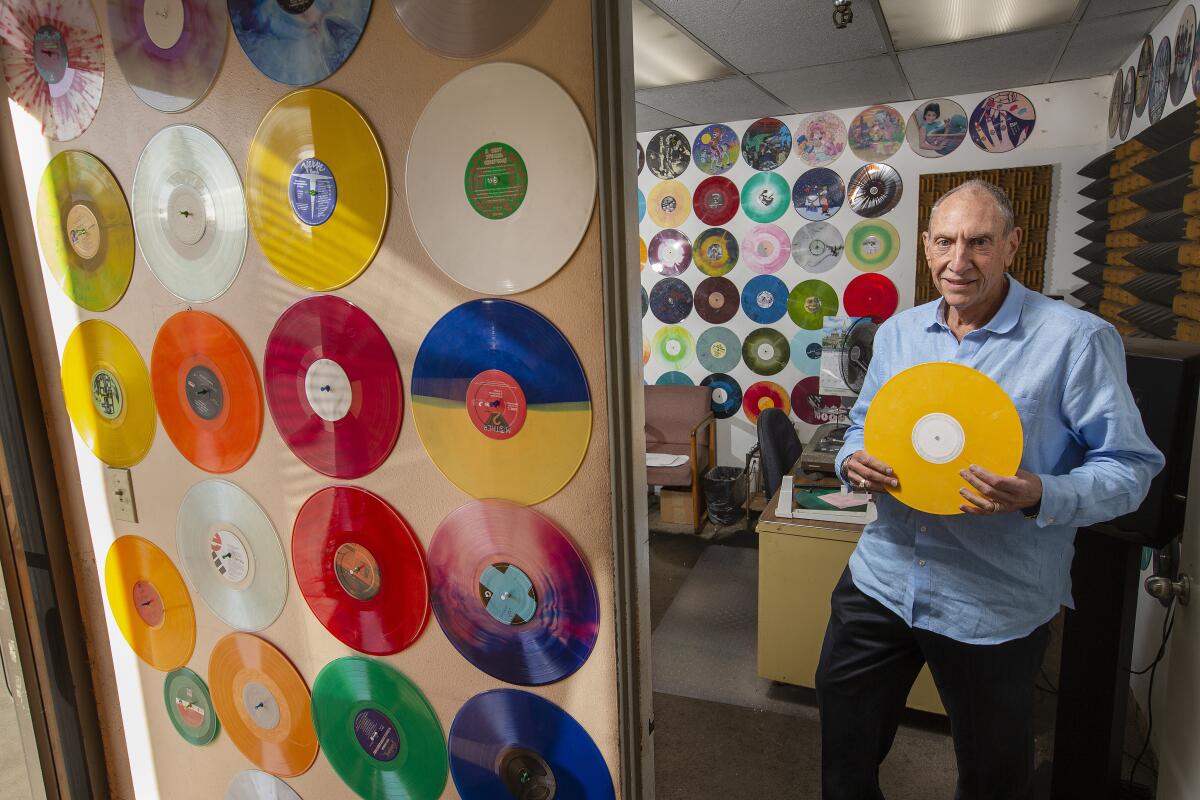
The phone’s been ringing nonstop as longtime clients commiserate and arrange shipment of their stampers, plates and album art. “It’s amazing how many people you touch over the years,” Sheldon said.
A dozen thick ledgers in a cabinet outside Sheldon’s office prove his point. They log each 33-, 45- and 78-rpm record, CD, cassette, multicolored variant and fish-head-shaped single made at Rainbo. One imposing 300-page book from the mid-1990s, for example, tracks orders from punk labels including Epitaph, SST, Touch and Go, Frontier and In the Red; rap imprints Death Row, Priority, Delicious Vinyl, Cold Chillin’ and Sugar Hill; early dance labels Moonshine, Mushroom and Thump; and Concord Jazz, Rhino, Scotti Bros. and American.
Over the decades Sheldon has had to negotiate with labels and artists fighting over product and has, upon occasion, been paid five-figure invoices with stacks of tattered cash. He’s watched as FBI agents raided the plant in search of bootleg albums. And he’s timed pickups to ensure Crip-connected artists didn’t encounter Blood-affiliated entourages.
“Rainbo kind of became the plant for the rappers,” Sheldon says with classic understatement as he passes a framed display of gold records commemorating sales of Death Row artists 2Pac, Snoop Dogg and Tha Dogg Pound. But as the Rainbo ledgers prove, for every big-league success story there were hundreds of one-and-done independent releases issued by mom-and-pop labels scattered across America.
Lisa Fancher of the L.A. punk label Frontier relied on Rainbo for nearly 40 years. Her first project with the pressing plant, the 1980 album “Group Sex” by the Circle Jerks, almost didn’t happen. “I had to beg my parents, anybody in the world that would give me some money” to commission 5,000 copies. Frontier has since pressed hundreds of thousands of records by Suicidal Tendencies, Christian Death and more with Rainbo.
Then there were companies like Westwood-born Rhino Records, which transformed the business through its curatorial approach to resurrecting overlooked music.
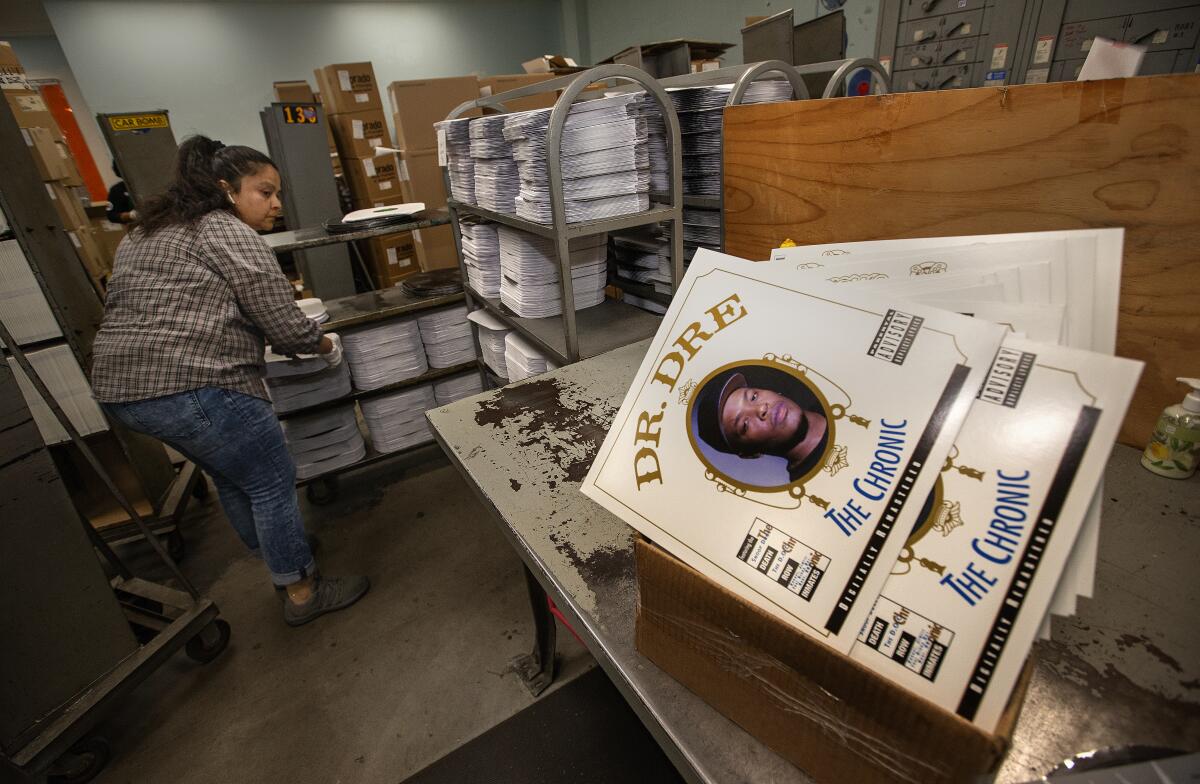
“If it wasn’t for Rainbo, Rhino wouldn’t have succeeded,” says Brian Schuman, who started his career in the mid-1970s as vice-president of operations for Rhino and is now senior vice-president of operations at longtime Rainbo client Concord Music Group, home of artists including St. Vincent, Elvis Costello, Denzel Curry and Tanya Tucker.
When he was at Rhino, Schuman used to contract with Rainbo to make its oddball mid-’70s records by Wild Man Fischer, the Temple City Kazoo Orchestra and wrestler Fred Blassie. For the label’s novelty single “Fish Heads” by Barnes & Barnes, Rainbo achieved a first: fish-head-shaped picture discs.
“Rainbo kept the doors open and didn’t put us on credit hold when we had trouble paying our bills. It was a relationship that we had with them, and that’s a real rare thing,” Schuman says. He predicts that Rainbo’s demise will make it harder on West Coast artists and indie labels.
‘It was always hard for the little guy to get records made. Now it’s going to be that much harder.’
— Brian Schuman
“It was always hard for the little guy to get records made. Now it’s going to be that much harder,” he says.
Stan Schneider, Rainbo’s longtime accountant, says Jack Brown knew the record business “better than anybody in the country.”
“He had a vision,” says Schneider, who was once was singing cowboy Gene Autry’s personal accountant, managed superstar country singer Glen Campbell’s career for five decades and has overseen the Brown estate’s interest in Rainbo since the owner’s death. “He was a very creative guy, and music was his love.”
Brown’s legacy consumes a room near the lobby, where, amid old phonograph players, his Rolodex, prototypes, plaques and press clippings, there are boxes filled with the entrepreneur’s letters. In his 20s, Brown strove to be a writer, and his papers are dense with pitches, short stories and scripts.
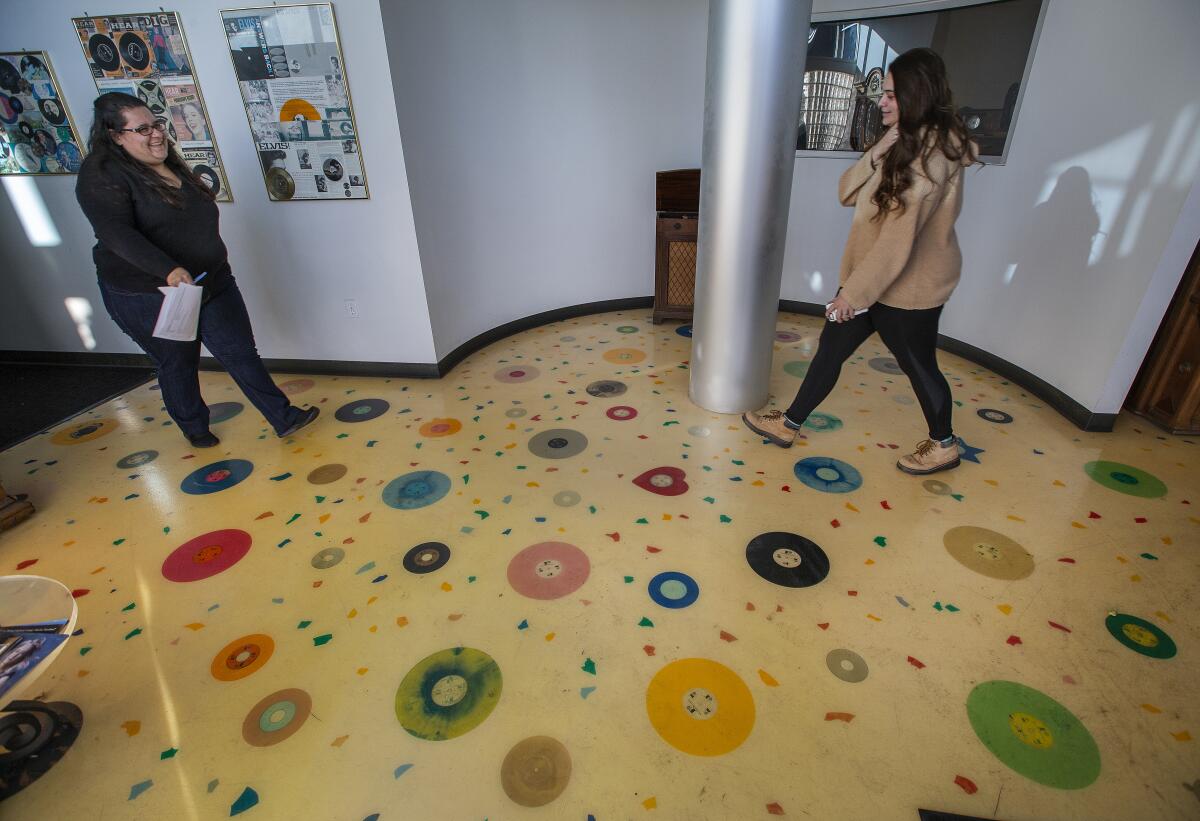
Those scripts and pitches didn’t sell, so Brown sought a more reliable income and in 1939 incorporated Rainbo as “manufacturers of recording discs” in downtown Los Angeles. One of the company’s first major commissions came via the U.S. Treasury Department: families who purchased war bonds during World War II were given the opportunity to record messages to their sons fighting in Europe.
Brown served in the Navy during the war, and when he returned, he pushed Rainbo into product development. He wanted to patent durable, paper-thin records that could be glued to flat surfaces, and the product he ultimately came up with was a variation on the flexi-disc, which became a ubiquitous presence in music magazines until the advent of the CD.
In 1954, Rainbo teamed with General Mills to sell 30 million Wheaties cereal boxes, each with a record printed on it. A few years later, the Disney contract kept presses active as millions of Disneyland visitors bought a foldout map of the park. Described as “a trip through Disneyland you can see and play whenever you wish,” the Mattel-branded product included five Rainbo-pressed discs that described attractions in Tomorrowland, Frontierland and Fantasyland.
Brown’s shop started to manufacture long-playing albums and 45-rpm singles in the 1950s and ‘60s. When the facility was located on Las Palmas Avenue in Hollywood, it was part of a district housing pressing plants that pumped out millions of records each month.
Rainbo was grossing about $4 million annually when it moved to Santa Monica in 1974 and invested in cassette duplicators, automatic pressing equipment, high-speed plating and shrink-wrap machines to become a one-stop shop. Two dozen presses pushed out Donna Summer and Bee Gees product, easy listening and budget classical recordings, and bawdy comedy releases by Redd Foxx, Slappy White and Skillet & Leroy.
Schneider recalls swinging by the plant just to marvel at the machines at work: “They took a little piece of vinyl — they called it a biscuit — just this blob of vinyl, put it in and all of the sudden you had music. It was magic to me.”
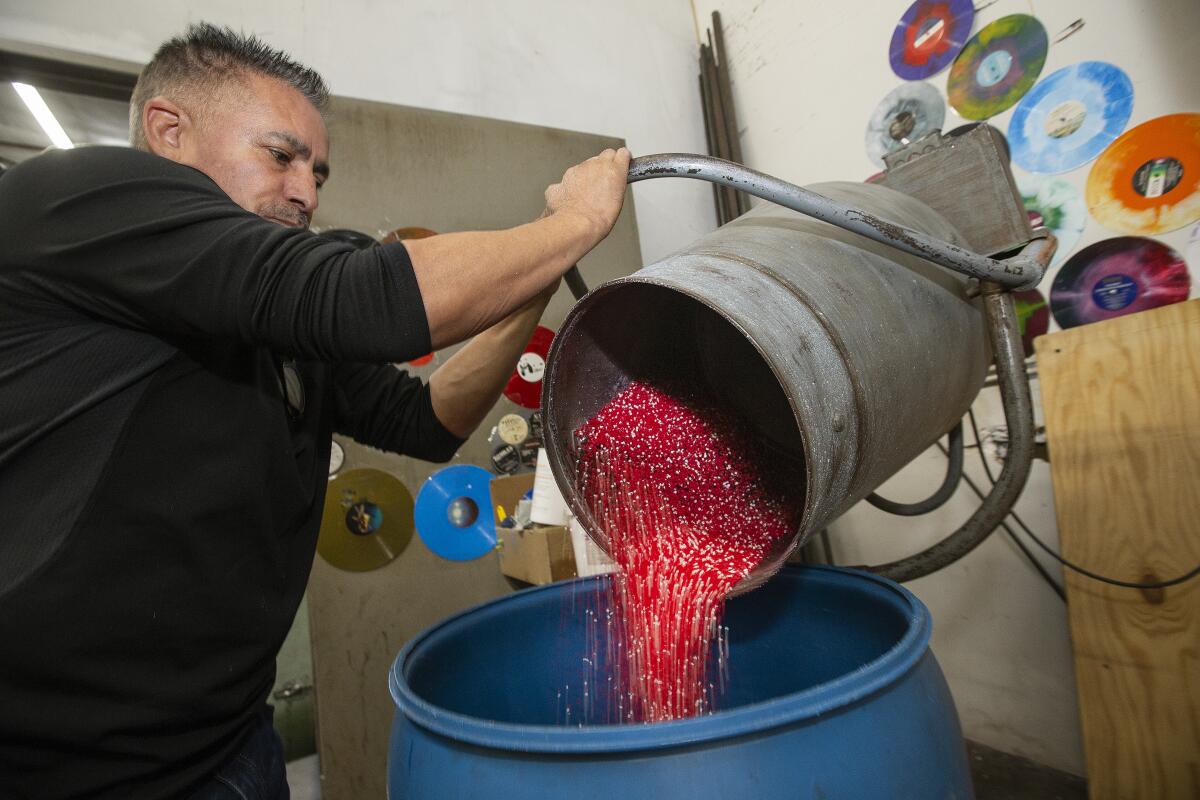
The music industry’s shift to compact discs nearly shuttered the company, but Brown adapted. “I’ve witnessed the move from mono to stereo. Then came 4-track tape, which was bulky,” he said in 1990. “Next came 8-tracks, which were smaller, and cassettes, which were even better.” After buying a CD/DVD manufacturing company in the early ’00s, Rainbo moved to Canoga Park in 2006.
As Rainbo’s accountant, Schneider was at times incredulous at Brown’s investments: “Jack started doing cassettes and I’d think, ‘Oh, my God, you’re spending so much money on concepts like that!’ Then the CD came and he spends a million dollars to build a CD plant!”
But the accountant notes that when Brown died in 2004, “they were making a lot of money for a small company.”
In late December, Rainbo’s manufacturing equipment, including all of its presses, was hauled to Nashville on 14 semi trucks. United Records, which has been in business since 1949, bought it all, including the Rainbo name, client list and a choice selection of memorabilia.
Whether in L.A. or Nashville, the recipe for making vinyl involves a process that’s less alchemy than it is chemistry, and it’s not exactly an environmentally friendly endeavor.
An essential part of the process, nickel plating, creates wastewater, and over the last four years, Rainbo has been repeatedly cited by the EPA for not filing required environmental reports.
The reality, Sheldon says, is that more industry-friendly states offer fewer environmental restrictions and lower minimum wages. “Dealing with state agencies and employee issues — [California] is not a friendly atmosphere for manufacturers.”
The deciding factor in Rainbo’s end, though, was the prospect of a 40% rent hike when the lease came up to renew in 2020. That spelled doom, Schneider says. “We were losing money. We had a nest egg, so we could afford to lose money for a while, hoping that things would turn around. But as good as Steve is, it was just too tough.” Everything has to be cleared out by Jan. 30.
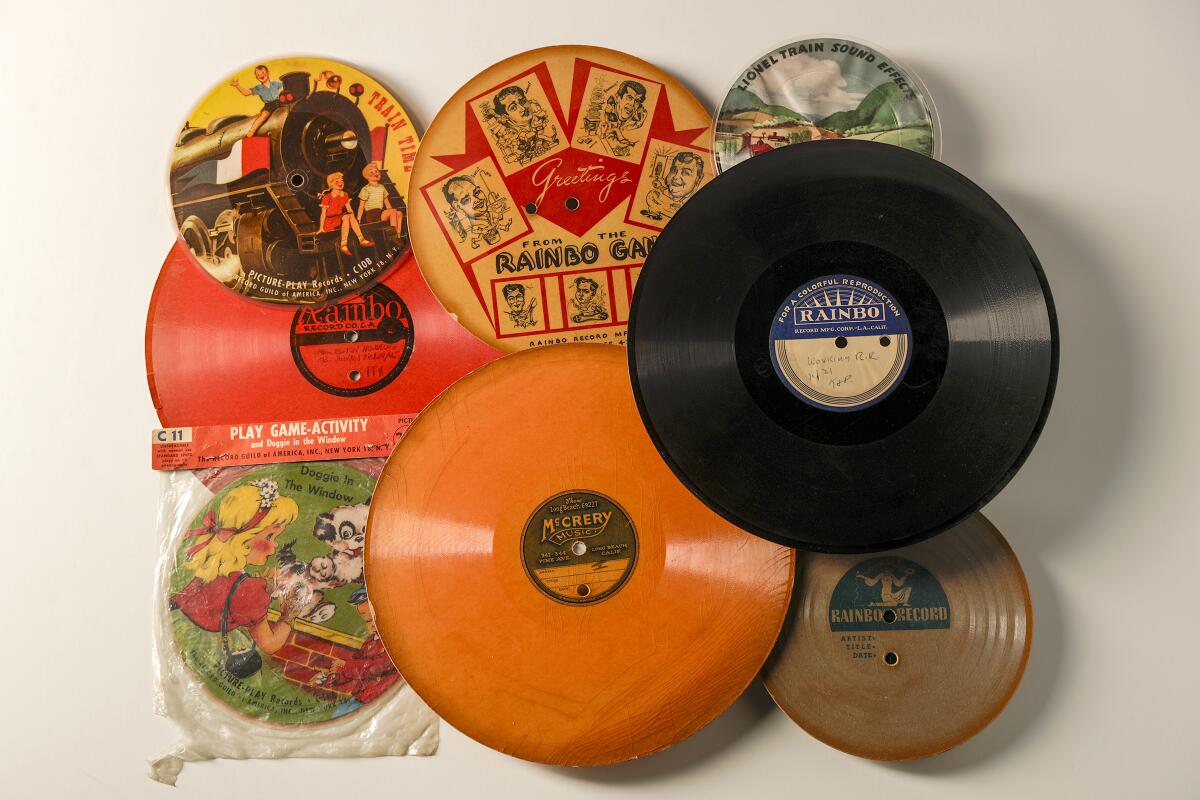
By early January the plant was nearly empty, but bits and pieces of memorabilia still hung on the walls. Aside from the red ledgers, which are headed to Nashville, the GM says the rest of Rainbo’s holdings — Brown’s prototypes, collection of one-off cardboard discs, file cabinets packed with multicolored sample records, the accumulation of phonograph players and a grand mural — are on the way to a warehouse about a mile away. Sheldon is hoping to find a permanent home for it all.
Even if he doesn’t, Rainbo’s legacy will endure in the musical grooves of millions of albums scattered in used record bins around the world. Digital files can be deleted. Spotify remains unprofitable. Apple Music is a loss leader.
Vinyl records, by contrast, will outlive us all, and the secrets they contain will sustain listeners for decades to come.
More to Read
The biggest entertainment stories
Get our big stories about Hollywood, film, television, music, arts, culture and more right in your inbox as soon as they publish.
You may occasionally receive promotional content from the Los Angeles Times.
